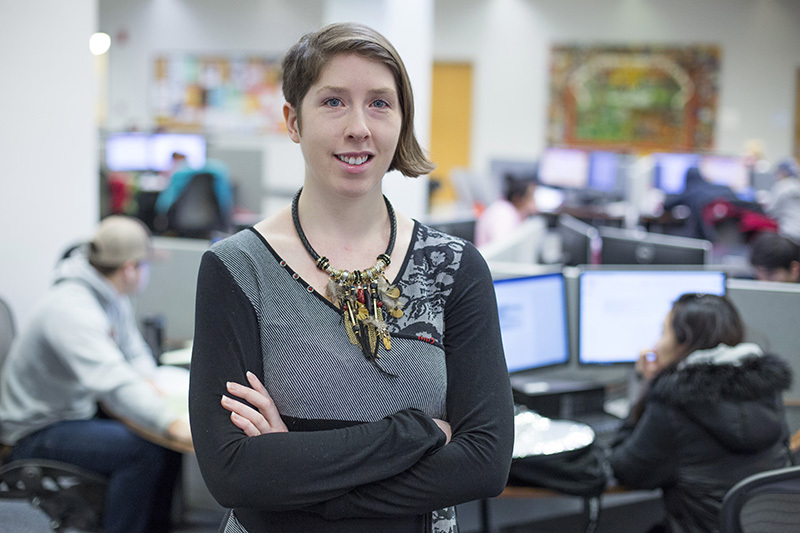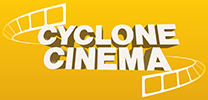Waiting

Photo by Christopher Gannon.
Sun dogs flanked the silhouetted campanile Wednesday morning. Sun dogs, caused by the refraction of sunlight through ice crystals in the atmosphere, show as bright, usually rainbow-colored spots on either side of the sun and at the same height above the horizon. Central campus was cold and quiet, awaiting the arrival of 'spring' semester Monday.
New website will link users to inclusion info
Several of Iowa State's colleges, units and departments offer inclusion and diversity resources for faculty, staff and students. But quickly accessing that information has been a challenge. That's all about to change.
The office of diversity and inclusion recognized the need for a one-stop, online hub to corral Iowa State's numerous inclusion resources. So, Nicci Port, a project director in the office, is leading the development of a university website, Inclusion@IowaState, to serve as a clearinghouse of inclusion information, connecting and directing both internal and external audiences to Iowa State's inclusion groups, initiatives and activities.
"Inclusion@IowaState is an opportunity to bring information together to better serve the university," Port said. "There had been no central resource for diversity and inclusion efforts at ISU before this."
The project supports Goal 4 of Iowa State's strategic plan -- to enhance the university climate for both the ISU community and visitors.
"Inclusion@IowaState is being built to showcase how the community is realizing Goal 4, and it will help answer the question of what the university is doing to enhance and cultivate the ISU experience for students, staff, faculty and visitors," Port said.
Phase one, help wanted
The site is live, but it's still a work in progress. The first of three phases wrapped up last month with some initial page development, including inclusion information from Iowa State's office of diversity and inclusion as well as the divisions of academic affairs, student affairs and university services.
A unique feature of this project is the opportunity for university employees with interests and skills in web development, information technology, program management and web accessibility to volunteer for the site's development team. Port will review application submissions and create a team to assist her with the site's final two phases. Those interested in nominating themselves or someone else for the web development team should visit Inclusion@IowaState and select "Join/nominate to the development team" in the right column.
Phase two
The largest project of phase two, which runs now through May, is mapping the university's inclusion "ecosystem." Port will work her way through the university's organizational chart, surveying leaders of campus units to determine who is responsible for inclusion activities in their areas and what those activities are.
Phase two also will include development of an input form for the online inclusion inventory. Members of the campus community would use it to submit information about inclusion endeavors on campus. As the list is developed, Port's web development team will construct a searchable inventory that will detail Iowa State's inclusion activities.
The third major component of phase two involves partnering with University Library staff, who will help Port envision a digital repository of inclusion information, similar to the library's existing repository.
Phase three
Phase three will commence in May. Projects scheduled are a user interface for the inclusion inventory, the final digital repository and a visual representation of the inclusion ecosystem. An official website launch is slated for August, though the site will remain live while it's being developed, an intentional decision by Port.
"I want to get community input during development," she said. "That's the reason behind making it visible to the public as it evolves."
Once the site is fully up and running next fall, anyone will be able to search and locate information about Iowa State's inclusion initiatives, a step in the right direction, according to Port.
"This site will put our best foot forward," she said. "It will give users a more complete view of the inclusion landscape at ISU, provide everyone on campus the chance to contribute to that view, make it easier to recognize people for the efforts they make around diversity and inclusion topics, and uncover opportunities for improving how the campus community can realize Goal 4 of the strategic plan.
"There is so much room for growth, and with the engagement of the campus community, we are excited about the possibilities," Port said.
Five questions for a liaison librarian

Erin Thomas is a liaison librarian at Parks Library. She serves as a library research expert for material science and engineering as well as mechanical engineering. She also oversees the library's standards collection. Photo by Christopher Gannon.
Taking a break from a day of studying spreadsheets, Erin Thomas recently spoke with Inside Iowa State about the life of a liaison librarian -- a group of 15 in the library's research and instruction services department who serve as subject-matter experts for finding information in specific fields. Each academic department has a liaison at Parks Library who can help faculty and students find what they need.
The basics
Name: Erin Thomas
Position: Liaison librarian
Time at ISU: 2.5 years
Education: Bachelor's in linguistics and master's in library and information science, University of Wisconsin, Madison
What does a liaison librarian do compared to the perception of what a librarian does?
The perception I had of a librarian growing up was the person behind the counter who would tell you to shush and would help you find books. That was all I knew about what they did until I went to library school. Then I found out there were all these cool, fantastic things that academic librarians -- and subject liaison librarians, especially -- do that I found really fascinating. There are some days when I'm teaching. There are some days when I'm selecting materials to add to the library's collection. There are other days where I'm selecting things to withdraw from the collection. I do tours. I do seminars. I do all kinds of stuff.
You are the liaison to the materials science and engineering and mechanical engineering departments. Does that involve working with faculty and researchers, or more with students?
It depends a lot on which departments and areas you're working with. I don't tend to work a lot with faculty in some of my departments. A lot of times, they're doing research with industry. They aren't able to disclose what they're working on. So they direct me to their students, to teach their students how to do good research, or they send the students in their labs to me to be trained on the library side of the research process. In other disciplines, there are liaison librarians that work very closely with faculty on their research. If I'm working with faculty, it's usually to develop online modules or in-class, in-person instruction sections I'll deliver to their students. I often start my presentations for students by saying I'm not an engineer. I'm not an expert in engineering. What I am an expert in is finding information, particularly engineering-related information -- things like standards, patents, handbooks, conference papers, all the things they'll be looking for.
You're an expert in standards. What are standards? It seems like they're pretty important.
You see the effects of having standards everywhere, but a lot of people are unaware that they even exist. They're agreed-upon ways of doing certain things or making certain products. They'll be very specific about how that product should perform or what its specifications should be. They're the reason you can go to the store and buy any brand of lightbulb, and it'll fit in your lamp. It's a little-known fact that we do have a standards collection in the library. We have a standards center hidden on the first floor of the library where you can go and use any of our industry standards that we have. It's hard to sum it up because there are so many things in there. The one I take with me when I'm teaching engineering students about standards for the first time is a joke standard that was released in the 1970s, which is the standards and specifications for a dry martini. The students get a kick out of that.
The spreadsheets you're studying – what are you looking at?
When we're asked to assess various aspects of the collection for different reasons, we'll get data to help us make decisions about what to keep, what to move to the storage building. My goal always is to make things more accessible and increase what we can offer to our faculty and students. I know it seems like we have this gigantic building when you first walk in. But there's never enough space for all of the stuff that is being added to the collection each year. Not everything is available online, though some of us might wish it was. Sometimes things do get added to online collections we have, and we go back to assess whether we still need these old print copies or not. Sometimes we do. Sometimes they have images in them that were not captured very well when they were scanned to put online. Sometimes the online versions might not include advertisements, which might be important for people who are studying that. Sometimes we'll look at how many other libraries in the world have a print copy of this particular book or journal at this point. If there's not very many, we might hang on to ours to make sure there's still going to be access.
What is something faculty and staff don't know about the library that you'd like them to know?
Probably the biggest one is that they have a liaison librarian for their department. I talk to too many faculty members who have no idea there is such a thing. We can provide a lot of resources for them and their students.
Zipcar is the new car-sharing provider on campus

Zipcar vehicles arrived on campus this week.
Zipcar is the new provider for Iowa State's car-sharing program, and vehicles were delivered to campus this week. The contract runs through June 2021, with an annual renewal option thereafter. Enterprise's CarShare program had been on campus since fall 2011.
While students are the primary audience for car sharing, employees are welcome to enroll as well.
Car sharing's popularity is based on economy and sustainability. Drivers reserve vehicles by the hour or day for personal use -- shopping, dining out, visiting friends -- to avoid the expense of purchasing and maintaining their own set of wheels. Car sharing can be a factor in reducing the number of student vehicles on campus.
Transportation services remains the vehicle provider for university-sponsored travel.
Learn more
The world's largest car-sharing network, Zipcar also services the most college campuses -- more than 600 across North America. Zipcar pricing includes gas, insurance, maintenance, 24-hour roadside assistance and 180 miles of driving (per 24 hours). Members must be at least 18 years old and have a valid driver's license.
The Cyclone fleet
Initially, the Zipcar fleet at Iowa State will feature these three vehicles:
- Black Nissan Versa
- White Ford Focus
- Black Ford Fiesta
The first two vehicles are parked in the Stange Road lot just north of the railroad tracks (Lot 119) and the third is parked west of Martin residence hall (Lot 1). The Zipcar reserved stalls are identified with green signs. Demand for the program could increase this inventory over time.
"Offering this 24-hour, on-campus service provides our community members with access to cars when they need them," said director of sustainability Merry Rankin. "It also eliminates the hassle and challenge of maintaining and parking a personal car."
How to join
The Zipcar annual membership fee is $25, but Ford, which is a Zipcar partner, subsidizes the first year, reducing the cost to $15 for students, faculty and staff. Current Enterprise CarShare members may join Zipcar for free through Zipcar's Iowa State website.
Ford also subsidizes the hourly rate for its vehicles on university campuses. As a result, the hourly rate starts at $7.50 and the daily rate at $69.
Members can apply online. Membership cards, which provide access to the Zipcar vehicles, are sent within a week via U.S. mail. Zipcar reservations -- from one hour to seven days -- are made online or via a mobile app. Members hold their card over a card reader on the windshield to unlock and lock a Zipcar. Keys and a gas card are kept in each vehicle.
New provider
Zipcar is a subsidiary of Avis Budget Group. Procurement services rebid the service this summer and director Cory Harms said Zipcar employees have shown a willingness and capacity to promote and expand car sharing at Iowa State. Under the previous contract, three assigned vehicles had shrunk to two.
"We're confident this is a better program and will get utilization up," Harms said, noting that car-sharing programs at universities the size of Iowa State typically use 10 to 15 vehicles.
Driver rules
Zipcar requests these six courtesies from its members:
- Report damage to the toll-free Zipcar number (and inspect the car before driving)
- Clean out trash and personal items when you return a vehicle
- Don't smoke in the car
- Fill the gas tank if it's down to a quarter tank or less (use the fuel card inside the car)
- Return the vehicle on time (avoid a late fee)
- Keep pets in travel carriers
Hub, Hilton parking projects go to regents
Four Iowa State projects are scheduled to receive state Board of Regents approval next week when the board convenes in its Urbandale office. The primary purpose of the Jan. 9-10 meeting is to conduct mid-year performance reviews for the institution heads and executive director Mark Braun. The agenda includes a short consent list, scheduled for a board vote at 1 p.m. Jan. 9.
Audio of open portions of the meeting will be livestreamed on the board's website. The evaluations will be completed in closed sessions.
Up for board approval are:
- A university proposal to house the interdisciplinary Nanovaccine Institute, which the board approved in June but has functioned as a multi-institution research venture since 2013, on the unfinished fifth floor of the new Advanced Teaching and Research Building. The request is to begin planning the project. Anson Marston Distinguished Professor in chemical and biological engineering Balaji Narasimhan serves as director for the institute, which includes about 70 scientists from 21 universities, health care companies and national laboratories. The project budget is estimated at up to $6.5 million, to be covered by university funds and private gifts. Occupants on the ATRB's other floors are scheduled to begin moving in this March.
- A proposal by ISU Dining to renovate and reconfigure about 75 percent of the Hub interior to separate the coffee and grill venues and reduce congestion. The plan moves the coffee venue to the north end of the building (phase 1). The southeast corner of the building, now used primarily for vending, would be converted to back-of-house functions. The existing seating areas would be renovated. ISU Dining will pay for the estimated $2.4 million project. The timeline calls for bidding the project in the spring, with the coffee venue ready by the start of fall semester and the grill area several months later. This is the board's final approval.
- A proposal by the athletics department to reconstruct and expand the parking lots immediately north and south of Hilton Coliseum (C1 and C2) and the roads on the east and west sides of the building. The number of highest-level donors to the department continues to grow, as does feedback about crowding and lack of parking for basketball games. The project includes additional sidewalks, new lighting, improved accessibility and a dedicated parking area for the visiting team bus. The addition of a north driveway to Lincoln Way, for event day use only, is being studied. Athletics department funds will cover the estimated $3.8 million cost. This is the board's final approval.
- Revised plans and budget for recreation services' proposal to upgrade, irrigate and light the intramural fields east of Willow residence hall. The project would increase $580,000 (about 28 percent) for additional turf upgrading, a retaining wall and some paved areas to better handle foot traffic. Recreation services funds will cover the revised $2.7 million cost. The board initially approved this project in August 2017.
Cyclone Cinema brings 14 recent releases to campus this semester
Cyclone Cinema's spring semester film series opens next week with the espionage comedy, "Kingsman: The Golden Circle," a sequel to the 2015 launch. Through the last week of class, the series will feature 13 additional recently released films, two showings per night, Thursday through Sunday, in 101 Carver.

Hosted by the Student Union Board, admission to Cyclone Cinema is free and the public is welcome. Candy, bottled soda and water, and popcorn are sold for $1-$2.
Sunday captions
Cyclone Cinema's Sunday screenings include captions. To see captions at other screenings, ask one of the student volunteers before the movie begins.
Spring semester lineup
- Jan. 11-14, "Kingsman: The Golden Circle" (rated R), starring Taron Egerton and Julianne Moore
- Jan. 18-21, "Battle of the Sexes" (PG-13), Emma Stone and Steve Carell
- Jan. 25-28, "Murder on the Orient Express" (PG-13), Kenneth Branagh and Penelope Cruz
- Feb. 1-4, "Only the Brave" (PG-13), Josh Brolin and Miles Teller
- Feb. 8-11, "All the Money in the World" (R), Michelle Williams and Mark Wahlberg
- Feb. 15-18, "Justice League" (PG-13), Ben Affleck and Gal Gadot
- Feb. 22-25, "Thor: Ragnarok" (PG-13), Chris Hemsworth and Cate Blanchett
- March 1-4, "The Greatest Showman" (PG), Hugh Jackman and Zac Efron
- March 8-9, "The Post" (PG-13), Meryl Streep and Tom Hanks
Spring break
- March 22-25, "Jumanji: Welcome to the Jungle" (PG-13), Dwayne Johnson and Kevin Hart
- March 29-April 1, "Father Figures" (R), Owen Wilson and J.K. Simmons
- April 5-8, "Coco," animated (PG), voices of Anthony Gonzalez and Gael Garcia Bernal
- April 12-15, "Star Wars, The Last Jedi" (PG-13), Daisy Ridley and Mark Hamill
- April 19-22, "Molly's Game" (R), Jessica Chastain and Idris Elba
